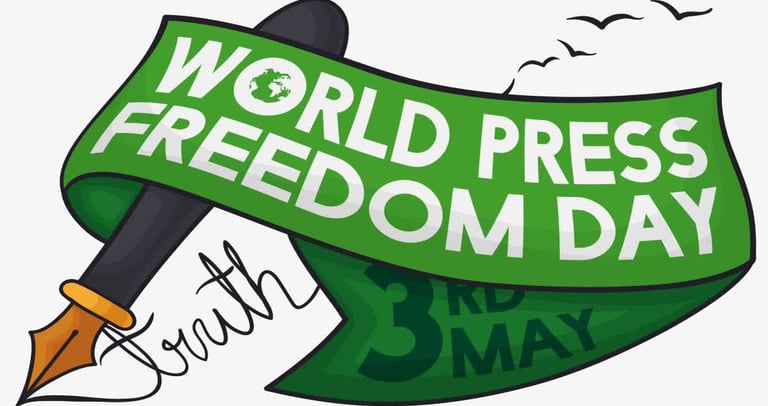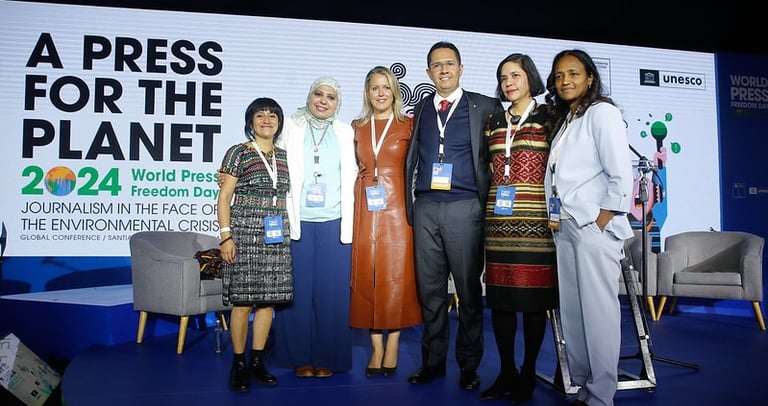A Reflection on World Press Freedom Day
World Press Freedom Day, celebrated every May 3rd, highlights the essential role of free journalism in sustaining democracy and human rights. This day prompts a global reflection on the adversities journalists endure to report the truth, emphasizing the need for robust protections for the press. Each year, the day is marked by a theme that addresses pressing media-related issues, advocating for a well-informed public and accountable governance worldwide.
4 min read


The Genesis and Significance of World Press Freedom Day
World Press Freedom Day, observed on May 3rd each year, was proclaimed by the UN General Assembly in December 1993, following the recommendation of UNESCO's General Conference. This decision was inspired by the Windhoek Declaration, a statement produced by African journalists in 1991 that called for media pluralism and independence. Since then, the day has been celebrated worldwide to raise awareness of the importance of press freedom and to remind governments of their duty to respect and uphold the right to freedom of expression under Article 19 of the Universal Declaration of Human Rights.
The day serves multiple purposes: it acts as a moment to celebrate the fundamental principles of press freedom; assess the state of press freedom throughout the world; defend the media from attacks on their independence; and pay tribute to journalists who have lost their lives in the line of duty. The significance of this day lies in its ability to unite the global community in a shared commitment to fundamental human rights. It's a call to action for all stakeholders, including governments, media organizations, and civil society, to ensure that the legal guarantees for press freedom are respected in both spirit and letter.
World Press Freedom Day not only reflects on current achievements and challenges but also commemorates the anniversary of the Declaration of Windhoek, a statement of free press principles put together by newspaper journalists in Africa during a UNESCO seminar on "Promoting an Independent and Pluralistic African Press" held in Windhoek, Namibia, in 1991. This declaration emphasized the importance of a free, independent, and pluralistic press in the development and maintenance of democracy in a nation, and for economic development.
Each year, UNESCO also marks this occasion by issuing a report that provides a reflection on the current state of press freedoms worldwide, highlighting key issues and regions where press freedom is compromised or under threat. The observance of World Press Freedom Day is a reminder of the ongoing struggles faced by journalists and media workers in many parts of the world, and the need for the continuous defense of their rights.


Contemporary Challenges and Annual Themes of World Press Freedom Day
World Press Freedom Day not only commemorates the historical milestones of press freedom but also addresses the modern challenges journalists face globally. Each year, the day is marked by a theme that reflects pressing issues relevant to media operations and press freedom. For instance, the 2024 theme, "Journalism in the face of the Environmental Crisis," underscores the critical role of journalism in reporting on environmental challenges and sustainability, emphasizing the need for media coverage that can influence policy and public perception regarding environmental conservation.
The themes chosen each year aim to highlight different facets of press freedom and the obstacles journalists encounter, from censorship and digital surveillance to physical threats and legal harassment. For example, past themes have focused on topics such as "Media for Democracy: Journalism and Elections in Times of Disinformation" and "Information as a Public Good," reflecting the evolving landscape of challenges that impact how media operates and how journalists are able to report.
These annual themes are not just symbolic; they guide discussions, workshops, and conferences around the globe, facilitated by UNESCO and various press freedom organizations. This concerted focus helps in steering international efforts to support journalists and media workers, providing them with the knowledge, tools, and protections needed to carry out their work effectively and safely. Each theme encourages a global dialogue among media professionals, policymakers, legal experts, and advocates to explore solutions for enhancing media freedom and ensuring journalists can report without fear of repercussion.
The significance of these discussions is further amplified by the global recognition of the risks that journalists face. According to Reporters Without Borders (RSF), numerous journalists are detained, held hostage, or forcibly disappeared each year. Events and initiatives tied to World Press Freedom Day aim to combat these injustices by fostering a safer environment for the press through advocacy, awareness, and action.


Recognizing Courage and Fostering Global Solidarity on World Press Freedom Day
World Press Freedom Day culminates in the celebration and recognition of those who have shown extraordinary courage and resilience in the field of journalism. One of the highlights of this day is the UNESCO/Guillermo Cano World Press Freedom Prize, awarded annually to honor a person, organization, or institution that has made a significant contribution to defending and promoting press freedom, especially under threat. Named after Guillermo Cano Isaza, a Colombian journalist who was assassinated for his brave editorial stance against powerful drug cartels, the prize symbolizes the ongoing fight against oppression and the need for safe journalistic practices.
The ceremony not only commemorates those who have faced peril but also inspires a collective resolve to support press freedom globally. It serves as a reminder of the sacrifices made by journalists and the importance of continuing to protect these vital rights. The day also encourages reflection on the broader implications of press freedom for democracy, governance, and human rights, reinforcing the need for societies worldwide to uphold the principles of transparency and accountability.
Further, the global observance of World Press Freedom Day fosters solidarity among journalists, media companies, policymakers, and advocates, facilitating a network that spans across borders to support and protect media practitioners. This network plays a crucial role in advocacy efforts, pushing for changes in policy and practice that enhance media freedom and ensure the safety of journalists everywhere.
As the day ends, the focus shifts from reflection to action, with various stakeholders motivated to continue their work in promoting free and fair journalism. This persistent effort is vital in a world where media freedom is under constant threat from various quarters, be it through censorship, economic pressures, or outright violence.
The ongoing dialogue and initiatives sparked by World Press Freedom Day are essential in making meaningful progress toward a future where journalists can operate freely and safely. For more details on how this day impacts global media practices and the resources available for journalists, visit UNESCO’s World Press Freedom Day page and explore initiatives and support mechanisms offered by entities like Reporters Without Borders.

Contact
Subscribe to our newsletter
Stay informed with global news updates on our main site
www.worldpressfreedom.com
© 2012 - 2026 WPF News
Michael Bosworth, Founder,
CEO & Chief Content Officer
